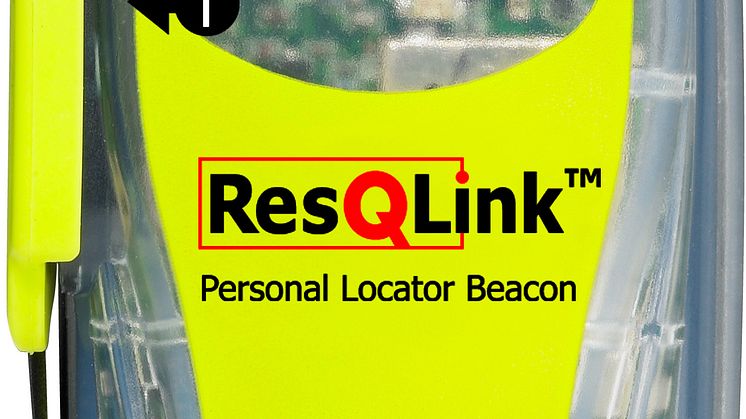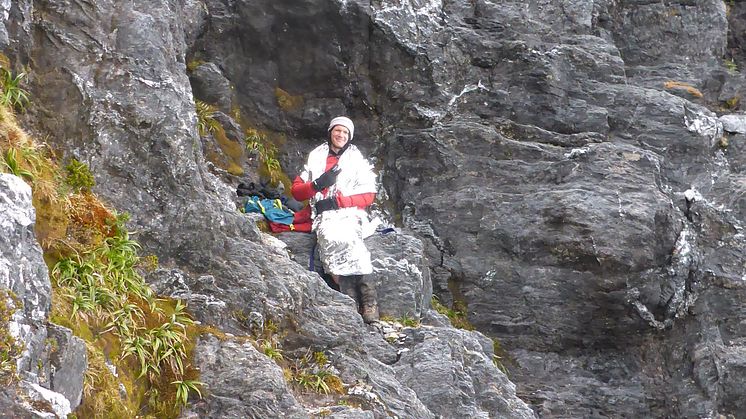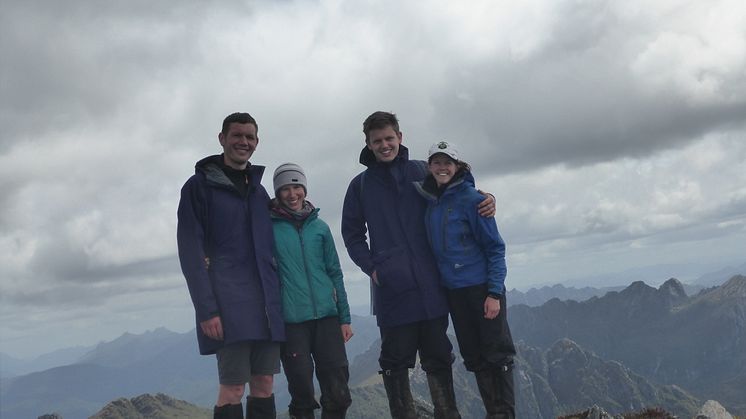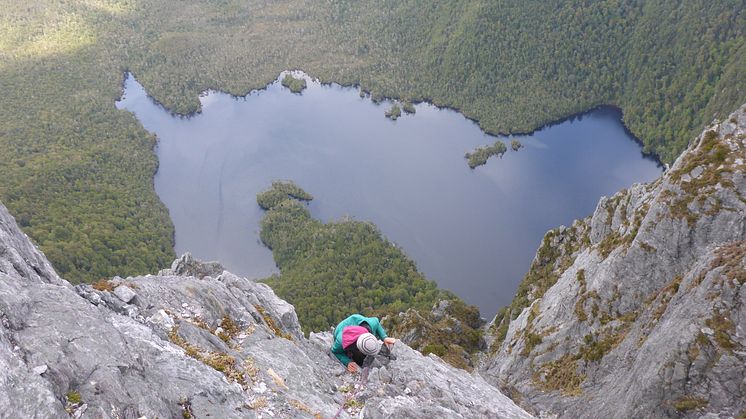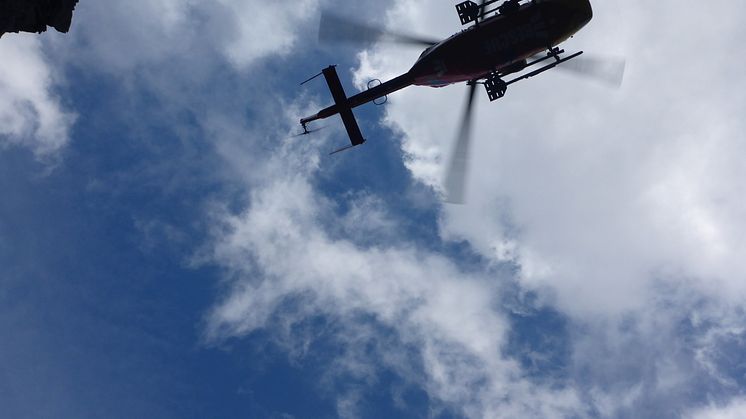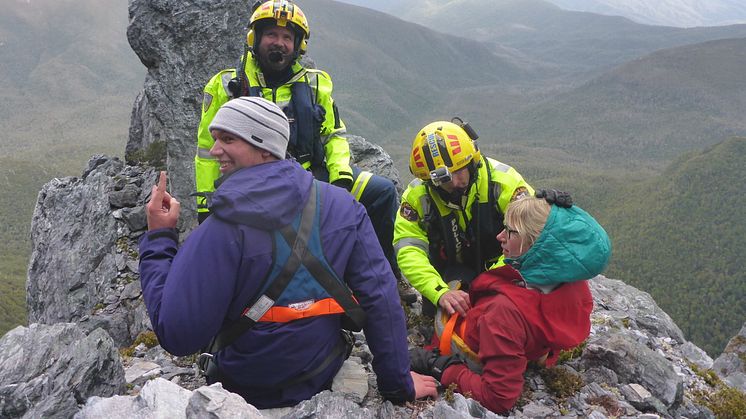
Press release -
ACR Electronics: Injured Climber Rescued from Federation Peak in Tasmania after Activating Personal Locator Beacon
A new survivor story from ACR Electronics, a Drew Marine Company
Stranded with a badly broken leg on steep, rocky terrain in the middle of a dangerous mountain descent in deteriorating weather, Ed Bastick was in a potentially life-threatening situation.
The 29-year-old climber was part of an experienced four-man team including his fiancée Ashdyn, 27, brother Robert, 23, and his girlfriend Katherine, 22, on a six-day trek to the summit of Federation Peak in south west Tasmania in November last year when disaster struck.
After reaching the summit, the group began the challenging climb down with Ed deciding to tackle an easier section without using ropes as back up. However, he lost his handhold and fell about 10 metres onto a ledge, narrowly avoiding a larger drop.
Ed said: “I approached a vertical crack and lowered myself into it. Hanging on with my fingers, I looked for a solid foothold, but could only find loose rocks. Then the rock I was clinging to with my left hand broke away. After what seemed like a frantic few seconds while I tried to regain a secure hold, my right fingers slipped and I fell.
“Falling about 2 meters, I bounced off a small ledge breaking my right leg. After falling another 6 to 8 metres, I landed on my back in a narrow couloir full of loose shale. I slid for a metre or so before self-arresting on some exposed roots, just short of an even larger drop. I was pretty shaken, my right foot was sticking out at 90 degrees from what it was meant to be but I was alive!”
Significantly, the group was carrying an ACR Electronics ResQLink Personal Locator Beacon (PLB) which Ed was able to activate immediately. The Westpac Rescue Helicopter arrived within an hour just as the cloud had started to descend and Ed and his fiancée were winched off the mountain and transported to Hobart hospital where he underwent surgery to pin the bones in his ankle.
Westpac Rescue Helicopter intensive care paramedic Dave Brown told the The Examiner newspaper in Launceston Tasmania: “We’re searching around and then we find these four people perched basically on the side of the summit. Because the weather was closing in and there were some fuel issues we had to get him going pretty quickly. (Having a personal locator beacon) just means that instead of waiting up to one or two days you can be found within 6 or 8 hours, sometimes less.”
Vowing to start climbing again as soon as he has recovered, Ed paid tribute to the rescue services and urged other climbers and hikers to always carry a PLB.
He said: “My advice to other climbers and hikers regarding PLBs is to always carry one. It’s far better to have one and not need it, than need it and not have it. For us, carrying a PLB ensured there was a good ending to a situation that could have been much, much worse.
“The south west of Tasmania is renowned for its isolation and unpredictably bad weather. Every one of us are experienced bushwalkers in our own right with a number of years of rock climbing under our belts, but we always carry a PLB. Tasmania is a corner of the world where every year a number of people die in the wilderness, often because they have no way of getting help.
“I have carried a ResQLink on trips for a while but I can certainly now attest to how effective they are in an emergency. I would like to thank ACR Electronics for developing such a quality product that survived the fall better than I did and still functioned. I can now also appreciate the work of the emergency services and am especially grateful to the Westpac chopper team.”
The highly skilled crew from the Westpac Rescue Helicopter Service, which is part of Tasmania’s emergency services, are called out every day on a variety of missions, from rescuing bushwalkers in Tasmania’s rugged World Heritage Areas to motor vehicle accidents or maritime emergencies.
In their safety steps, Westpac advises hikers to carry a PLB so they can call for help from the emergency services if they get lost or injured. They continue: “A PLB with an inbuilt GPS is great for bushwalkers because it can give searchers your accurate position, even in rugged and remote terrain. EPIRB’s (Electronic Position Indicating Radio Beacon) transmit a coded message via satellite to the nearest rescue co-ordination centre. Consider taking two PLB’s or a PLB and a Satellite Phone in two separate packs, there have been many times when the backpack with the PLB in it has been dropped and unable to be retrieved. Can you keep it on your person as you walk?”
A growing list of survivors from Australia and New Zealand who activated ACR Electronics beacons in a life-threatening emergency have joined the ACR’s SurvivorClub to share their stories and help raise awareness about the best practices to ensure safety, both on land and at sea. The full story about Ed Bastick’s rescue is at https://www.acrartex.com/survivors/stories/2016/bastick-invermay-tas#sthash.E3s5dQsQ.dpbs
For more than 60 years, ACR has had the honor of manufacturing lifesaving equipment for military forces, aviation and space programs, and for maritime and outdoor enthusiasts from around the world. Read real-life testimonies at https://www.acrartex.com/survivor-club/.
Ends
Social media notes:
- For sharing this content on social media please tag our accounts as well as the SAR agency associated with the story. Use #savedbythebeacon or #ACRelectronics in your post as well, so we may report your story.
- If you require images such as: survivor images, logos or product images, please reply to this e-mail with your request.
For further information, please contact:
ACR Media Relations
Mikele D’Arcangelo or Nichole Kalil
Tel: +1 954-862-2115/2180
E-mail: nichole.kalil@acrartex.com
www.acrartex.com
or
Saltwater Stone
Jules Riegal or Clive Bartlett
Tel: +44 (0)1202 669244
E-mail: j.riegal@saltwater-stone.com
www.saltwater-stone.com
Related links
Topics
Categories
About ACR Electronics, Inc.
ACR Electronics, Inc. a Drew Marine Company designs and manufactures a complete line of safety and survival products. Available products include Emergency Position Indicating Radio Beacons (EPIRBs), Personal Locator Beacons (PLBs), ARTEX Emergency Locator Transmitters (ELTs), Search and Rescue Transponders (SARTs), Strobe Lights, Life Jacket Lights, Boat Search Lights, and other associated safety accessories. ACR’s facility Quality Management System (QMS) is certified by TUV USA and is certified in accordance with AS9100C / ISO 9001:2008 standards. Additionally ACR maintains FAA Part 145 Repair Station Certification status.Recognized as the world’s leader in safety and survival technologies, ACR has provided safety equipment to the marine, outdoor and aviation industries as well as to various worldwide government agencies since the late 1950’s.

